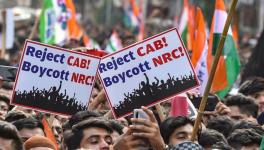UN Offers Seamless Partnership to India’s Judiciary
Michelle Bachelet, United Nations High Commissioner for Human Rights (September 1, 2018 –). File photo
The UN Human Rights Council’s move to approach the Supreme Court on the Citizenship Amendment Act (CAA) is already triggering a response in our country that can only be called the manifestation of ‘Pavlovian conditioning’ — a classical conditioning, which during the 1890s, the Russian physiologist Ivan Pavlov first noted while researching salivation in dogs in response to being fed.
Pavlov predicted that dogs would salivate in response to the food placed in front of them, but he also noticed that his dogs would begin to salivate whenever they heard the footsteps of his assistant who was bringing them the food.
The Indian spokesman’s tweet in response to the UNHRC move is that the CAA is an “internal” matter and no foreign party has any locus standi on issues pertaining to India’s sovereignty. But this knee-jerk reaction in its narrow interpretation of Westphalian sovereignty is irrelevant when it comes to the UN as the watchdog, since the UN has been founded on the basis of universal principles and ideals.
We always have a choice to quit the UN if we find the world body to be a tormentor. So far, we have only refused to abide by UN resolutions. Now we are in strategic defiance of one of the UN’s most prestigious flag carriers.
There is a paradox here. Remember, one of the first foreign policy initiatives by PM Modi after coming to power in 2014 was to address a Circular letter to the heads of governments of all UN member countries soliciting their support for India’s claim to be represented permanently in the UN Security Council. Whereas, Modi government is now lamenting that the UN itself is intrusive.
The Indian establishment’s stance is that the UN move on CAA is “unsustainable”. Indeed, many powerful countries will wholeheartedly endorse the Indian argument — Russia and China, for instance. But that is not the whole point.
The heart of the matter is that the UNHRC’s proposed appeal to the Supreme Court has a poignant backdrop — whether the Indian establishment likes it or not.
Its plea is to be appointed as an assistant or amicus curiae in a pending case on the CAA where the Supreme Court has not exactly been in tearing hurry to pass judgment. Simply put, the UNHRC has the skill and resources that may help the Supreme Court to expedite the case.
Which is of course a great thing, since the CAA is no doubt the most pressing issue in the national discourse today, for the public as well as the for the government and political leadership. (A leading daily featured a cartoon today hinting that PM Modi, perched on a lotus flower, is indulging in a gimmick to divert attention from the anti-CAA agitation by his dramatic decision to “give away” his social media accounts on Women’s Day to women “whose life and work inspire us”.)
Equally, a perception is gaining ground within India — and, more importantly, in the international opinion — that Modi government has put the Indian judiciary on a tight leash as part of its project to emasculate dissent and opposition.
There is no point pretending that we do not notice such a perception growing or that it is a most unfortunate thing to happen, since we all take immense pride in India being hailed on the global stage as a country with rule of law. (Read the stirring piece Mob rule is here to stay in India by Prem Shankar Jha.)
Now, the government is solely responsible for creating such a perception that the judiciary has become a handmaiden of the ruling party in carrying out its sectarian ideology.
Incidents such as the sudden transfer of Delhi High Court judge, Justice S. Muralidhar within hours of passing harsh strictures against the Delhi Police’s apathy in the recent communal riots is a telling example of where matters have reached.
Arguably, in the prevailing apocalyptic climate in our country, it may serve the interests of rule of law if the Supreme Court were to appoint the OHCHR as amicus curiae in the CAA case.
It will act as a deterrent against Justice Muralidhar’s dismal fate revisiting any other judge of integrity in our land and for buttressing the working of a truly independent judiciary that serves the constitution and rule of law.
This is vital since the Supreme Court verdict on the CAA is going to be a momentous event for India’s political economy and its foreign policy for a foreseeable future.
Succinctly put, OHCHR offers a firewall or insurance cover at a crucial juncture when the Supreme Court is expected to act impartially but is also seen as doing so — both nationally and internationally.
Since Mahatma Gandhi, India has not produced a figure of such high moral stature like Michelle Bachelet. Unsurprisingly, we seem to have a problem in understanding her motivations.
Bachelet herself has been a victim of torture at the hands of a dictatorial regime, who subsequently rose to become the elected president of her country when the brutal fascist dictators ended up in the dustbin of Chile’s modern history.
Suffice to say, she knows what she is talking about and silencing her when she holds a torchlight on the grotesque face of present-day India is going to be an uphill task. Her tenacity and the weight of the office she holds pose a severe challenge to the Modi government.
Above all, Bachelet carries immense prestige in the western capitals, whose acceptance Modi and EAM Jaishankar — and the ideologues of our current regime as a whole — so eagerly crave for behind their veneer of belligerent nationalism as a potentially strategic asset for India’s future trajectory as regional power.
Make no mistake, Bachelet’s shadow will follow Modi’s footfalls when he arrives in Brussels later this month. Modi’s European Union interlocutors, steeped in old world charm, will certainly not embarrass him. But what is of enduring significance will be the silent thoughts that would cross their mind when they sit across the conference table with Modi — what happened to the wonder that was India during the past five-year period under his watch.
Get the latest reports & analysis with people's perspective on Protests, movements & deep analytical videos, discussions of the current affairs in your Telegram app. Subscribe to NewsClick's Telegram channel & get Real-Time updates on stories, as they get published on our website.























